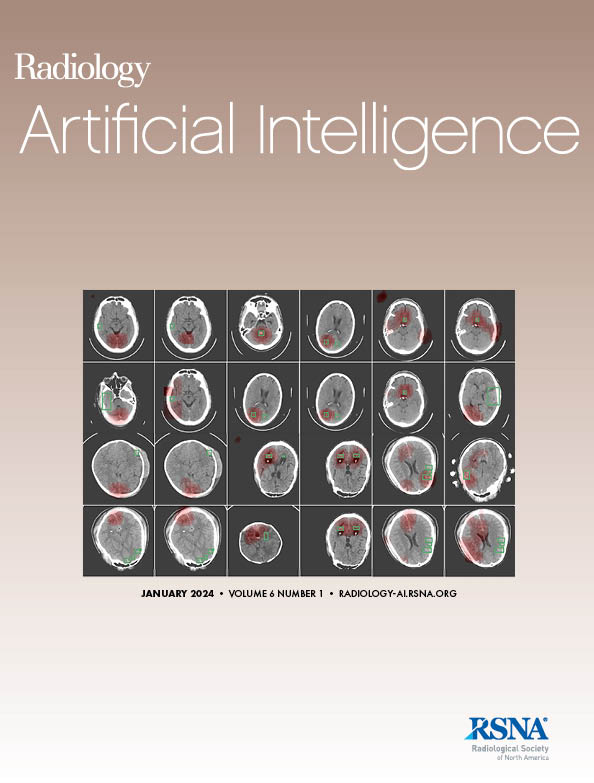Marius George Linguraru, Spyridon Bakas, Mariam Aboian, Peter D Chang, Adam E Flanders, Jayashree Kalpathy-Cramer, Felipe C Kitamura, Matthew P Lungren, John Mongan, Luciano M Prevedello, Ronald M Summers, Carol C Wu, Maruf Adewole, Charles E Kahn
下载PDF
{"title":"在放射学中部署人工智能的临床、文化、计算和监管考虑因素:RSNA 和 MICCAI 专家的观点。","authors":"Marius George Linguraru, Spyridon Bakas, Mariam Aboian, Peter D Chang, Adam E Flanders, Jayashree Kalpathy-Cramer, Felipe C Kitamura, Matthew P Lungren, John Mongan, Luciano M Prevedello, Ronald M Summers, Carol C Wu, Maruf Adewole, Charles E Kahn","doi":"10.1148/ryai.240225","DOIUrl":null,"url":null,"abstract":"<p><p>The Radiological Society of North of America (RSNA) and the Medical Image Computing and Computer Assisted Intervention (MICCAI) Society have led a series of joint panels and seminars focused on the present impact and future directions of artificial intelligence (AI) in radiology. These conversations have collected viewpoints from multidisciplinary experts in radiology, medical imaging, and machine learning on the current clinical penetration of AI technology in radiology and how it is impacted by trust, reproducibility, explainability, and accountability. The collective points-both practical and philosophical-define the cultural changes for radiologists and AI scientists working together and describe the challenges ahead for AI technologies to meet broad approval. This article presents the perspectives of experts from MICCAI and RSNA on the clinical, cultural, computational, and regulatory considerations-coupled with recommended reading materials-essential to adopt AI technology successfully in radiology and, more generally, in clinical practice. The report emphasizes the importance of collaboration to improve clinical deployment, highlights the need to integrate clinical and medical imaging data, and introduces strategies to ensure smooth and incentivized integration. <b>Keywords:</b> Adults and Pediatrics, Computer Applications-General (Informatics), Diagnosis, Prognosis © RSNA, 2024.</p>","PeriodicalId":29787,"journal":{"name":"Radiology-Artificial Intelligence","volume":" ","pages":"e240225"},"PeriodicalIF":8.1000,"publicationDate":"2024-07-01","publicationTypes":"Journal Article","fieldsOfStudy":null,"isOpenAccess":false,"openAccessPdf":"https://www.ncbi.nlm.nih.gov/pmc/articles/PMC11294958/pdf/","citationCount":"0","resultStr":"{\"title\":\"Clinical, Cultural, Computational, and Regulatory Considerations to Deploy AI in Radiology: Perspectives of RSNA and MICCAI Experts.\",\"authors\":\"Marius George Linguraru, Spyridon Bakas, Mariam Aboian, Peter D Chang, Adam E Flanders, Jayashree Kalpathy-Cramer, Felipe C Kitamura, Matthew P Lungren, John Mongan, Luciano M Prevedello, Ronald M Summers, Carol C Wu, Maruf Adewole, Charles E Kahn\",\"doi\":\"10.1148/ryai.240225\",\"DOIUrl\":null,\"url\":null,\"abstract\":\"<p><p>The Radiological Society of North of America (RSNA) and the Medical Image Computing and Computer Assisted Intervention (MICCAI) Society have led a series of joint panels and seminars focused on the present impact and future directions of artificial intelligence (AI) in radiology. These conversations have collected viewpoints from multidisciplinary experts in radiology, medical imaging, and machine learning on the current clinical penetration of AI technology in radiology and how it is impacted by trust, reproducibility, explainability, and accountability. The collective points-both practical and philosophical-define the cultural changes for radiologists and AI scientists working together and describe the challenges ahead for AI technologies to meet broad approval. This article presents the perspectives of experts from MICCAI and RSNA on the clinical, cultural, computational, and regulatory considerations-coupled with recommended reading materials-essential to adopt AI technology successfully in radiology and, more generally, in clinical practice. The report emphasizes the importance of collaboration to improve clinical deployment, highlights the need to integrate clinical and medical imaging data, and introduces strategies to ensure smooth and incentivized integration. <b>Keywords:</b> Adults and Pediatrics, Computer Applications-General (Informatics), Diagnosis, Prognosis © RSNA, 2024.</p>\",\"PeriodicalId\":29787,\"journal\":{\"name\":\"Radiology-Artificial Intelligence\",\"volume\":\" \",\"pages\":\"e240225\"},\"PeriodicalIF\":8.1000,\"publicationDate\":\"2024-07-01\",\"publicationTypes\":\"Journal Article\",\"fieldsOfStudy\":null,\"isOpenAccess\":false,\"openAccessPdf\":\"https://www.ncbi.nlm.nih.gov/pmc/articles/PMC11294958/pdf/\",\"citationCount\":\"0\",\"resultStr\":null,\"platform\":\"Semanticscholar\",\"paperid\":null,\"PeriodicalName\":\"Radiology-Artificial Intelligence\",\"FirstCategoryId\":\"1085\",\"ListUrlMain\":\"https://doi.org/10.1148/ryai.240225\",\"RegionNum\":0,\"RegionCategory\":null,\"ArticlePicture\":[],\"TitleCN\":null,\"AbstractTextCN\":null,\"PMCID\":null,\"EPubDate\":\"\",\"PubModel\":\"\",\"JCR\":\"Q1\",\"JCRName\":\"COMPUTER SCIENCE, ARTIFICIAL INTELLIGENCE\",\"Score\":null,\"Total\":0}","platform":"Semanticscholar","paperid":null,"PeriodicalName":"Radiology-Artificial Intelligence","FirstCategoryId":"1085","ListUrlMain":"https://doi.org/10.1148/ryai.240225","RegionNum":0,"RegionCategory":null,"ArticlePicture":[],"TitleCN":null,"AbstractTextCN":null,"PMCID":null,"EPubDate":"","PubModel":"","JCR":"Q1","JCRName":"COMPUTER SCIENCE, ARTIFICIAL INTELLIGENCE","Score":null,"Total":0}
引用次数: 0
引用
批量引用

 求助内容:
求助内容: 应助结果提醒方式:
应助结果提醒方式:


